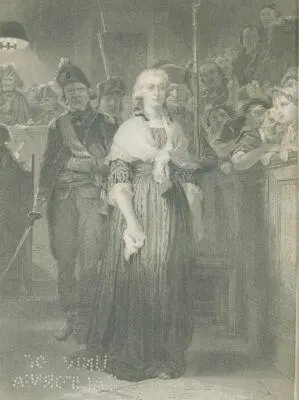John Stevens Cabot Abbott
The History of French Revolution
Including the History of the French Monarchy
Published by

Books
- Advanced Digital Solutions & High-Quality eBook Formatting -
musaicumbooks@okpublishing.info
2019 OK Publishing
EAN 4064066051594
Chapter I. Origin of the French Monarchy
Chapter II. The Houses of Valois and Bourbon
Chapter III. The Regency and Louis XV
Chapter IV. Despotism and Its Fruits
Chapter V. The Bastille
Chapter VI. The Court and the Parliament
Chapter VII. The Assembly of the Notables
Chapter VIII. The Appeal to the People
Chapter IX. Assembling of the States-General
Chapter X. The National Assembly
Chapter XI. Revolutionary Measures
Chapter XII. The Tumult in Paris
Chapter XIII. Storming the Bastille
Chapter XIV. The King Recognizes the National Assembly
Chapter XV. The King Visits Paris
Chapter XVI. Forming the Constitution
Chapter XVII. The Royal Family Carried to Paris
Chapter XVIII. France Regenerated
Chapter XIX. The King Accepts the Constitution
Chapter XX. Flight of the King
Chapter XXI. Arrest of the Royal Fugitives
Chapter XXII. Return of the Royal Family from Varennes
Chapter XXIII. Commotion in Paris
Chapter XXIV. The Approach of War
Chapter XXV. Agitation in Paris, and Commencement of Hostilities
Chapter XXVI. The Throne Assailed
Chapter XXVII. The Throne Demolished
Chapter XXVIII. The Royal Family Imprisoned
Chapter XXIX. The Massacre of the Royalists
Chapter XXX. The King Led to Trial
Chapter XXXI. Execution of Louis XVI
Chapter XXXII. The Reign of Terror
Chapter XXXIII. Execution of Marie Antoinette and Madame Elizabeth
Chapter XXXIV. The Jacobins Triumphant
Chapter XXXV. Fall of the Hebertists and of the Dantonists
Chapter XXXVI. Fall of Robespierre
Chapter XXXVII. The Thermidorians and the Jacobins
Chapter XXXVIII. Dissolution of the Convention
Chapter XXXIX. The Directory
Chapter XL. The Overthrow of the Directory and the Establishment of the Consulate

MARIE ANTOINETTE.
Chapter I.
Origin of the French Monarchy
Table of Contents
Extent of France.—Character of its early Inhabitants.—Conquest of Gaul.—Barbarian Invasion.—The Franks.—Pharamond.—Clovis.—Introduction of Christianity.—Clotilda.—Merovingian Dynasty.—Fields of March.—Anecdote of Clovis.—The Parisii.—Strife with the Nobles.—Moorish Invasion.—Charles Martel.—Pepin.—Fields of May.—Charlemagne.—His Policy.—Feudal System.—The Church.—Rolls.—Louis V.—Hugh Capet.—Parliament established by Philip the Fair.
Could one have occupied some stand-point in the clouds fifty years before the birth of our Savior, and have looked down upon that portion of ancient Gaul which has since been called France, he would have seen an immense undulating plain about six hundred and fifty miles square, bounded on the north by the Rhine, on the east by the craggy cliffs of the Alps, on the south by the almost impassable barriers of the Pyrenees, and on the west by the ocean. This beautiful realm, most admirably adapted in its physical features, its climate, and its soil to be inhabited by man, was then mostly covered with forest. Vast rivers, with their innumerable branches flowing in every direction, beautified the landscape and rendered the soil exuberantly fertile. About twenty millions of people, divided into more than a hundred independent tribes, inhabited this fair land. Life was with them all a scene of constant battle. They ever lived with weapons of war in their hands, seeking to encroach upon the rights of others or to repel those who were crowding upon them.
In this state of affairs imperial Rome cast a glance over the Alps upon Gaul, and resolved upon its conquest and annexation to the empire. Julius Cæsar, at the head of forty thousand men, descended through the defiles of the mountains and entered Gaul between the Lake of Geneva and Mount Jura. After a series of campaigns extending through ten years, and after sweeping with his invincible legions nearly two millions of men from his path, he succeeded in the entire subjugation of the country. Roman governors were appointed over the several provinces, and fortresses were reared and garrisoned by twelve hundred Roman soldiers, who enforced the laws of the empire. The arts, the civilization, and the refinements of Rome were gradually extended over the semi-barbaric Gauls, and for nearly four hundred years the country enjoyed general peace and prosperity. The southern portion of the province became distinguished for its schools, its commerce, and its elegance.
Toward the close of the third century the Roman Empire, enervated by luxury and vice, was visibly on the decline. Then commenced that mighty flood of invasion from the north which finally overran the whole of southern Europe, sweeping before it almost every vestige of the power and grandeur of the Cæsars. Army after army of skin-clad warriors, in aspect savage as wolves and equally merciless, crossed the Rhine, and in fierce and interminable battle fought their way over the plains of Gaul. For nearly four hundred years barbarian hordes from the shores of the North Sea, from the steppes of Tartary, even from far-off China, were pouring down upon southern Europe. Those in the rear crowded forward those in the advance. These clannish tribes, every where victorious, were slow to amalgamate. Each retained its distinctive laws, language, customs, and manners. For more than two centuries this cruel war continued, and all Gaul presented but a scene of tumult, terror, and carnage.
Among the marshes of the Lower Rhine there dwelt a fierce tribe called Franks, or Freemen. Early in the fifth century, Pharamond, the sovereign chief of this tribe, a man of extraordinary energy and sagacity, formed a confederacy with several other adjacent tribes, crossed the Rhine at various points, and after a series of terrific conflicts, which were protracted through many years, overpowered the Gauls under their Roman leaders, and took possession of the country nearly as far as the River Somme. Being the leading chief of the confederated tribes, he exerted a kind of supremacy over the rest, which may perhaps be considered as the first dawning of the French monarchy. The successors of Pharamond retained his conquests, and gradually extended their dominions until they were in possession of all the country between the Rhine and the Loire.
In the year 480 Clovis succeeded to the chieftainship of the confederation. Ambitious, unscrupulous, and energetic, he pushed his invading armies toward the Pyrenees, and for thirty years nearly all the south of France was a volcano of smoke and flame. His march, though attended with many reverses, was triumphant, and at the close of his career in the year 511 nearly all Gaul was partially subjected to his sway.
Christianity had previously entered Gaul from Rome. Clovis married Clotilda, the daughter of a Christian bishop. In the heat of one of his battles, as the tide of victory was setting against him, Clovis, raising his hands and eyes to heaven, exclaimed,
"O God of Clotilda! if thou wilt interpose and grant me this victory, I will renounce idols forever and become a Christian."
Читать дальше














